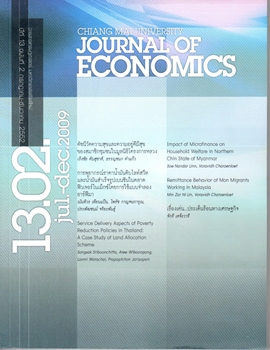ดัชนีวัดความสุขและความอยู่ดีมีสุขของสมาชิกชุมชน ในมูลนิธิโครงการหลวง
Keywords:
ความสุข, ความอยู่ดีมีสุข, มูลนิธิโครงการหลวง, แบบจำลองโพรบิตแบบเรียงลำดับ, Happiness, Well-being, Royal Project Foundation, Ordered Probit ModelAbstract
วัตถุประสงค์ของการศึกษานี้ คือ เพื่อสร้างดัชนีชี้วัดความสุขและความอยู่ดีมีสุขในระดับบุคคล ประเมินความสุขและความอยู่ดีมีสุขในระดับบุคคลจากดัชนีชี้วัดและจากการประเมินด้วยตนเอง และวิเคราะห์ปัจจัยที่กำหนดความสุขและความอยู่ดีมีสุขของสมาชิกชุมชนในมูลนิธิโครงการหลวง โดยข้อมูลได้จากการการสุ่มตัวอย่างสมาชิกโครงการหลวงจากศูนย์พัฒนาโครงการหลวงแม่ปูนหลวงและทุ่งหลวง จำนวน 469 ตัวอย่าง จากการประชุมกลุ่มชี้ให้เห็นว่าดัชนีความสุขและความอยู่ดีมีสุขประกอบไปด้วย 6 หมวดคือ เศรษฐกิจ ครอบครัว สุขภาพ สังคมและวัฒนธรรม สิ่งแวดล้อม และสวัสดิการสังคมและธรรมาภิบาล โดยพบว่ากลุ่มตัวอย่างให้นํ้าหนักดัชนีชี้วัดหมวดเศรษฐกิจมากที่สุด แต่เมื่อพิจาณาความแตกต่างทางด้านชนเผ่าพบว่า ชนเผ่ากะเหรี่ยงและม้งจะให้ความสำคัญกับครอบครัวมากที่สุด ซึ่งแตกต่างจากชนเผ่ามูเซอและลีซอที่ให้ความสำคัญกับเศรษฐกิจมากที่สุด โดยความสุขเฉลี่ยที่ได้จากตัวชี้วัดและการประเมินด้วยตนเองอยู่ในระดับปานกลาง นอกจากนี้จากการวิเคราะห์ปัจจัยที่กำหนดความสุขในแต่ละระดับด้วยแบบจำลองโพรบิตแบบเรียงลำดับพบว่า ดัชนีหมวดครอบครัว สังคมและวัฒนธรรม และสิ่งแวดล้อมมีนัยสำคัญทางสถิติ
This study intends to; 1) construct happiness and well-being index amid individual level, 2) evaluate individual’s happiness and well-being using index and self-assessment scheme, and 3) investigate factors affecting community members of Thai Royal Project Foundation’s happiness and well-being. The set of 469 observation handouts were randomly distributed throughout the community of Mae Poon Luang center and Tung Luang center locating in Chiang Mai, Thailand. According to the result from focusing group, happiness and well-being index are affected by 6 factors; 1) economic, 2) family relationships, 3) physical and mental health 4) social and cultural, 5) environment, 6) social-welfare and 7) good-governance. The most significant factor weighted from the whole studied group is economics. On the other hand, the hill tribe communities including Ka-Reng and Mong are mostly concern family relationship factor. The Lahu and Lisaw tribes are mostly concern economic factor. The average of happiness level calculated from happiness and well-being index is in the middle stage as well as the result from happiness self-assessment method. Additionally, the result from ordered-probit model indicates household, social and culture, and environmental to be statistically significant factors.
Downloads
Issue
Section
License
All opinions and contents in the CMJE are the responsibility of the author(s). Chiang Mai University Journal of Economics reserves the copyright for all published materials. Papers may not be reproduced in any form without the written permission from Chiang Mai University Journal of Economics.






